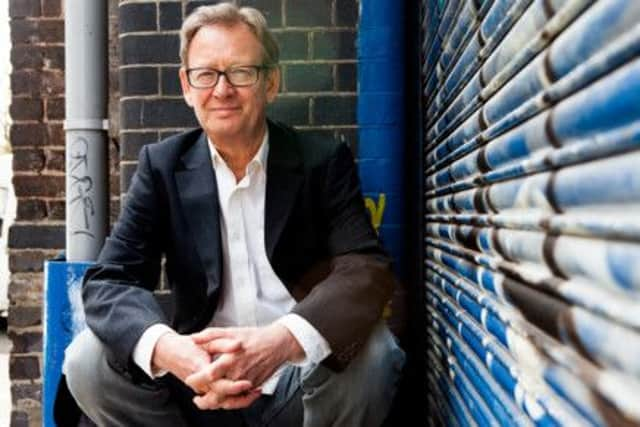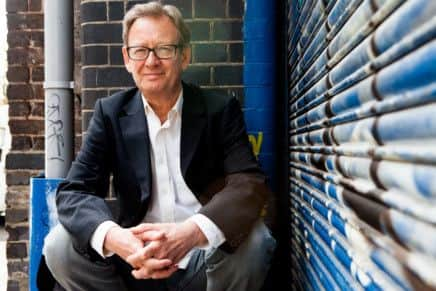Healing and music - the painful but rewarding journey of Russell Oliver Stone


Groove Aspects, following on from last year’s Love Aspects, is the middle album of a triptych which effectively offers Russell’s musical autobiography, concluding with Devotional Aspects next year.
Behind it all is a story of huge happiness followed by appalling loss.
Advertisement
Hide AdAdvertisement
Hide AdRussell will be remembered by millions as one half of the duo R&J Stone who had a worldwide hit with We Do It in 1976.


Tragically, the J of the duo, Russell’s wife Joanne, died of a brain tumour in 1979, prompting Russell’s decline into alcoholism, a path on which he was already set, he believes now.
Love Aspects was his first album for 36 years.
“Love Aspects was very much a studio album. It was picking up on a couple of songs that I had written at the end of the 1970s - soul songs, but then again everything I do has got a black musical influence, be it soul or r’n’b.
“Groove Aspects is different. It is all about my relationship with musicians, especially those guys I was on the road with for years in different bands. The album is about celebrating what musicians bring to the table, all about musicians and about how musicians create a groove.”
Advertisement
Hide AdAdvertisement
Hide AdLove Aspects tapped into the music of the 60s and 70s, the music that surrounded his early years in the business: “My song-writing reflects that; my vocal abilities reflect that as well.”
Russell’s duo with Joanne lasted from 1975-78: “I look back on it with enormous affection and great sorrow. It was a very emotionally-rich and diverse experience. Because of the work I have done since, I can plug into it. The problem with trauma is that it freezes you in that moment. The task of emotional growth and psychological well-being becomes to unfreeze that moment.
“It has taken me years. It is very complex to get to the simplicity of things. The nature of my psychological make-up was that it took me an enormous amount of pain to shift me out of the state I was in. That state was bad, very, very bad. It twists you. It distorts you. And it was enormously painful - painful to others as well, especially my family. But pain has a real function. It tells you that here is something that you have got to address.”
Asking why isn’t part of the healing: “That can be a trap. You have got to just face the pain, welcome the pain, open up to the pain for as long as it takes for the pain to ease. That pain is still there. I can visit it if I wish to, and sometimes I do wish to. When I did Love Aspects, I had to reface Joanne’s death...
Advertisement
Hide AdAdvertisement
Hide Ad“Joanne was part of that whole structure. Loss for us human beings is not easy especially when you have multiple losses in a short period of time. I lost my wife, I lost my career, I lost a wonderful friend, and eventually I lost the house. At the beginning it was impossible to deal with, and that’s why I reverted to alcohol.
“She was a beautiful person. She was warm and fantastic, a wonderful laugh, a fantastic smile. People were drawn to her. On the day of her funeral, the flower shops were emptied for a 20-mile radius. Afterwards, my musician buddies organised a benefit gig for the children (who were two and nine at the time). Cliff Richard was there, but I was still completely shot away at that time.
“But I know now that I was blessed to experience her living and her dying. I had the best of both worlds.”
Part of the legacy has been their great hit, We Do It, a song which touched millions and continues to do so. It was big in a number of European countries, it was bit in Canada, Australia and Brazil; and in the UK it made number five.
Advertisement
Hide AdAdvertisement
Hide Ad“But it punched above its weight in terms of the attention we were getting. We were splattered all over the dailies with the kind of publicity that you just cannot buy. We couldn’t believe it. The song just struck a chord.”
But fame didn’t sit easily with Russell. He sees now that it was too much of a responsibility. He was comfortable on stage, his natural arena, but being picked out and recognised made him feel uneasy.
“I couldn’t cope. That’s why I was going off my planet, and I would have done that even without Joanne’s death. Her death accelerated what was happening anyway. If there is an emotional fault line, life will eventually find it.”
His recollection is that the song just flowed in the writing: “I was never able to replicate that. The record company wanted another one, but I was never able to do that. But I was also having a real problem as a singer. I didn’t rate myself highly at all. Towards the end and Joanne’s death, I was thinking about not singing at all and just producing her. Things were already going seriously wrong.”
Advertisement
Hide AdAdvertisement
Hide AdBut even in the darkest moments that followed, We Do It kept him going.
“That song sustained me through the awful times. That was the one anchor I had. That was the song that represented the best of what I and Joanne were about. Her death triggered my collapse into alcoholism, but the song itself was what helped me through that period.”
/blob/ Russell Oliver Stone and his nine-piece ROS Band will be in action on Tuesday, July 8 at 8pm in Pallant Suite, 7 South Pallant, Chichester, PO19 1SY.